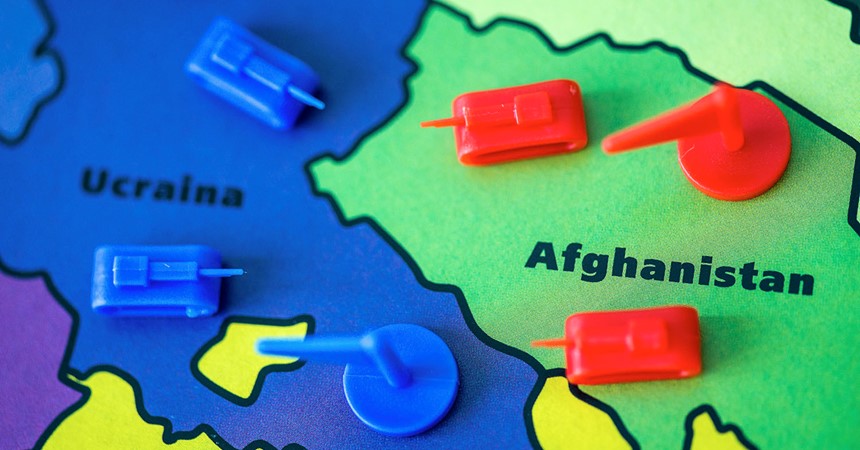Those of us ‘of a certain age’ may well remember newsreel footage of crowds cheering Winston Churchill as he joined King George VI and Queen Elizabeth on the balcony of Buckingham Palace on ‘Victory in Europe’ day in May 1945. The young Princess Elizabeth – the future Elizabeth II − was also present, wearing the uniform that was a sign of her war service. This celebration was an occasion of great joy at a victory won – the defeat of a wicked, godless and genocidal ideology. This was surely a just war, a war that Britain, and the British Empire, had not sought, had indeed attempted strenuously to avoid, but had fought in self defence and in the defence of humane civilisation.
Yet not everything about its victory was just – the Lancaster bombers that accompanied such victory demonstrations had rained death on German urban populations, killing many thousands of non-combatants and destroying a thousand-year-old cultural landscape, including many cathedrals and churches. Although the German armed forces fought for a wicked cause, they included countless fine young people whose lives were cut short by the tragedy of war. While studying in Germany in the 1980s, I joined the spectators at a joyfully comic Shrove Tuesday procession, complete with witches and goblins, in a devoutly Catholic part of Germany, and, in conversation with two kindly German women, learned of their brother who had died at the age of 19, near what was then called Leningrad in the Soviet Union. The memory of their dear brother called to mind the words recited in RSL clubs all over Australia, “They shall not grow old, as we that are left grow old…”
War can be just, but it is always tragic: each individual life is so precious that killing other human beings can only be a last resort in resistance to injustice. From the earliest centuries of its history, the Church has sought to come to terms with violence and killing. Whereas the pagan Roman empire had justified war in terms of the divine prerogatives of the Emperor, the Christian Church was based on the life and teachings of Jesus Christ, the suffering servant and prince of peace, who had rejected any attempt to conceive his proclamation of the Kingdom of God as the project of a military Messiah, a new King David. Yet once the Roman emperors themselves became Christian, they – and the Church – faced the question of the use of force for the sake of justice. Gradually, the theory of the just war was developed in Catholic tradition and largely shared by Protestant thinkers after the Reformation. Some key figures in this process were St Augustine (4th-5th centuries), St Thomas Aquinas (13th century), the Spanish scholastic theologians Vitoria (d.1546) and Suarez (d. 1617), as well as the Dutch Protestant thinker Hugo Grotius (d. 1645). The tradition that these writers developed became a crucial tool of interpretation, not only for Christians but also for secular thought, and continues to be taught to this day in military academies all over the world.
The theory of the just war consists of a number of key principles, both to guide the decision whether to go to war (in the traditional Latin jus ad bellum) and conduct in war (jus in bello). A just decision to go to war must be based on the following principles: A just cause; The war must be declared and waged by a legitimate authority; A right intention; As last resort; The expected results must be proportionate; There must be a reasonable hope of military success.
Conduct in war must be governed by the principles: Non-combatants must never be intentionally targeted; Weapons and conduct of war must be proportionate; The rights of enemy soldiers and civilians must be honoured.
Thankfully, we can reasonably hope that the prospect of ‘mutually assured destruction’ (MAD), which so dominated the decades of the Cold War, is in the past. Clearly, any use of nuclear weapons cannot meet the test of proportionality. Today, the question of the just war concerns in particular local wars that may be limited to ‘conventional’ weapons, where it is possible to argue that there is a reasonable hope of military success with a proportionate use of force.
Two categories of conflict are relevant here: the ‘responsibility to protect’ on humanitarian grounds, and resistance to terrorism. The concept of the ‘responsibility to protect’ was recently developed − with important contributions from Australia’s former Minister for Foreign Affairs Gareth Evans – in order to recognise that not all just wars are wars of national self defence, and that national sovereignty is not absolutely inviolable. From this perspective, if a national government is engaging in genocide or ethnic cleansing, the international community has a responsibility to intervene on humanitarian grounds. This approach appealed to NATO’s intervention in Kosovo in 1999, and argued that atrocities such as those perpetrated in Rwanda and Srebrenica could have been avoided if similar measures had been taken. Resistance to terrorism includes the ‘responsibility to protect’ intention (eg in relation to the Yazidis who were mortally threatened by Daesh in 2014), as well as the intention to attack and degrade Daesh’s military capability as a grave threat to peace in the Middle East.
When Pope Francis affirmed at a press conference in August 2014 that it was ‘licit’ to stop Daesh, he was simply drawing on the just war tradition in relation to unjust aggression: “In these cases where there is unjust aggression, I can only say that it is licit to stop the unjust aggressor. I underscore the verb "stop"; I don't say bomb, make war − stop him. The means by which he may be stopped should be evaluated.” The Pope affirmed that the world community has the right to disarm the aggressor: how it should do that is a matter of stringent just war reasoning, in the light of the criteria developed since ancient times. It is a fundamental part of political responsibility to judge how to defend the innocent in ways that are both proportionate and have some hope of success in bringing about a peace which respects justice.























































































